formerly eScholarship Editions


|
|
|
|
Your search for
'Middle Eastern History' in subject
found 57 book(s). | Modify Search | Displaying 21 - 40 of 57 book(s) | |
| 21. | 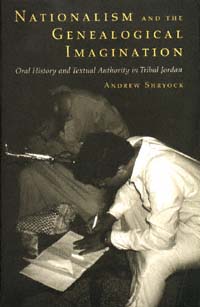 | Title: Nationalism and the genealogical imagination: oral history and textual authority in tribal Jordan Author: Shryock, Andrew Published: University of California Press, 1997 Subjects: Anthropology | Middle Eastern Studies | Middle Eastern History Publisher's Description: This book explores the transition from oral to written history now taking place in tribal Jordan, a transition that reveals the many ways in which modernity, literate historicity, and national identity are developing in the contemporary Middle East. As traditional Bedouin storytellers and literate historians lead him through a world of hidden documents, contested photographs, and meticulously reconstructed pedigrees, Andrew Shryock describes how he becomes enmeshed in historical debates, ranging from the local to the national level.The world the Bedouin inhabit is rich in oral tradition and historical argument, in subtle reflections on the nature of truth and its relationship to poetics, textuality, and power. Skillfully blending anthropology and history, Shryock discusses the substance of tribal history through the eyes of its creators - those who sustain an older tradition of authoritative oral history and those who have experimented with the first written accounts. His focus throughout is on the development of a "genealogical nationalism" as well as on the tensions that arise between tribe and state.Rich in both personal revelation and cultural implications, this book poses a provocative challenge to traditional assumptions about the way history is written. [brief] Similar Items |
| 22. | 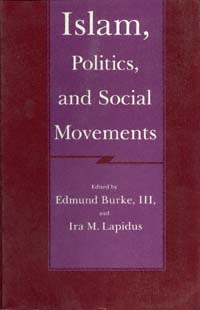 | Title: Islam, politics, and social movements Author: Burke, Edmund 1940- Published: University of California Press, 1990 Subjects: History | Middle Eastern History | Middle Eastern Studies | Politics Publisher's Description: Taken together the essays in this work not only provide new research essential to the study of Islamic societies and Muslim peoples, but also set a new standard for the concrete study of local situations and illuminate the forces shaping the history of modern Muslim societies.This collection is unique in its sophisticated interpretation of the social protest and political resistance movements in Muslim countries during the nineteenth and twentieth centuries. The contributors take two principal approaches to the study of their subject. Utilizing "new cultural history," they explore how particular movements have deployed the cultural and religious resources of Islam to mobilize and legitimize insurgent political action. Others rely on "new social history" to study the economic, political, and social contexts in which movements of anti-colonial resistance and revolution have developed. This work brings together contributions from specialists on Islamic North Africa, Egypt, the Arab fertile crescent, Iran and India. [brief] Similar Items |
| 23. | 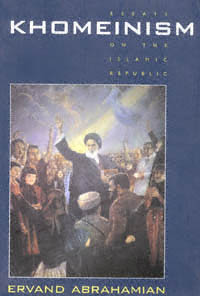 | Title: Khomeinism: essays on the Islamic Republic Author: Abrahamian, Ervand 1940- Published: University of California Press, 1993 Subjects: History | Politics | Middle Eastern History | Middle Eastern Studies Publisher's Description: "Fanatic," "dogmatic," "fundamentalist" - these are the words most often used in the West to describe the Ayatollah Khomeini. The essays in this book challenge that view, arguing that Khomeini and his Islamic movement should be seen as a form of Third World political populism - a radical but pragmatic middle-class movement that strives to enter, rather than reject, the modern age.Ervand Abrahamian, while critical of Khomeini, asks us to look directly at the Ayatollah's own works and to understand what they meant to his principal audience - his followers in Iran. Abrahamian analyzes political tracts dating back to 1943, along with Khomeini's theological writings and his many public statements in the form of speeches, interviews, proclamations and fatwas (judicial decrees). What emerges, according to Abrahamian, is a militant, sometimes contradictory, political ideology that focuses not on issues of scripture and theology but on the immediate political, social, and economic grievances of workers and the middle class.These essays reveal how the Islamic Republic has systematically manipulated history through televised "recantations," newspapers, school textbooks, and even postage stamps. All are designed to bolster the clergy's reputation as champions of the downtrodden and as defenders against foreign powers. Abrahamian also discusses the paranoia that permeates the political spectrum in Iran, contending that such deep distrust is symptomatic of populist regimes everywhere. [brief] Similar Items |
| 24. | 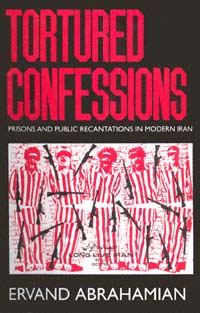 | Title: Tortured confessions: prisons and public recantations in modern Iran Author: Abrahamian, Ervand 1940- Published: University of California Press, 1999 Subjects: History | Middle Eastern History | Politics | Middle Eastern Studies Publisher's Description: The role of torture in recent Iranian politics is the subject of Ervand Abrahamian's important and disturbing book. Although Iran officially banned torture in the early twentieth century, Abrahamian provides documentation of its use under the Shahs and of the widespread utilization of torture and public confession under the Islamic Republican governments. His study is based on an extensive body of material, including Amnesty International reports, prison literature, and victims' accounts that together give the book a chilling immediacy.According to human rights organizations, Iran has been at the forefront of countries using systematic physical torture in recent years, especially for political prisoners. Is the government's goal to ensure social discipline? To obtain information? Neither seem likely, because torture is kept secret and victims are brutalized until something other than information is obtained: a public confession and ideological recantation. For the victim, whose honor, reputation, and self-respect are destroyed, the act is a form of suicide.In Iran a subject's "voluntary confession" reaches a huge audience via television. The accessibility of television and use of videotape have made such confessions a primary propaganda tool, says Abrahamian, and because torture is hidden from the public, the victim's confession appears to be self-motivated, increasing its value to the authorities.Abrahamian compares Iran's public recantations to campaigns in Maoist China, Stalinist Russia, and the religious inquisitions of early modern Europe, citing the eerie resemblance in format, language, and imagery. Designed to win the hearts and minds of the masses, such public confessions - now enhanced by technology - continue as a means to legitimize those in power and to demonize "the enemy." [brief] Similar Items |
| 25. | 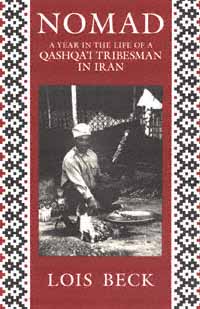 | Title: Nomad: a year in the life of a Qashqa'i tribesman in Iran Author: Beck, Lois 1944- Published: University of California Press, 1991 Subjects: Anthropology | Cultural Anthropology | Middle Eastern Studies | Middle Eastern History Publisher's Description: Borzu Qermezi was the headman and political leader of a group of nomadic pastoralists who were part of the Qashqa'i confederacy of southwest Iran. Proud, complex, strong-willed, witty, and cunning, Borzu successfully led his people on their annual migrations for many years. He regulated their travel; mediated conflicts; intervened in (and sometimes exacerbated) tense situations between his people and other nomads; and dealt with the government police agency. Structuring the account around the four seasons, Lois Beck recounts the day-to-day activities of Borzu during the year she spent traveling with his people. She describes the rigors of nomadic life and the consequences of decisions made in haste.During 1970 to 1971, Borzu and his people were faced with many difficulties. When the expected winter rains did not fall, pastures and crops shriveled. Unable to sell their starving livestock for any profit, Borzu's people saw their debts to urban merchants and moneylenders increase. At the same time, Iran exercised more bureaucratic control over the Qashqa'i by applying new policies over migratory schedules and the allocation of scarce pastures, and by introducing non-Qashqa'i agriculturalists and livestock investors as legitimate land users. All these measures threatened the nomad's way of life and eventually undermined the role of headmen such as Borzu. Lois Beck details the vicissitudes endured by Borzu's people and the strategies he devised to cope with them.Blending ethnographic and historical material, this book contains information unavailable for other tribal and nomadic pastoral groups in the Middle East and central Asia. Through Beck's deft analysis, we come to understand why nomadic pastoralism was once an important part of this vast region, and why tribal society has endured. [brief] Similar Items |
| 26. | 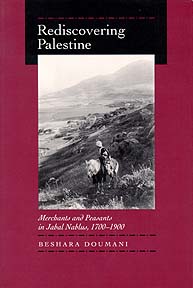 | Title: Rediscovering Palestine: merchants and peasants in Jabal Nablus, 1700-1900 Author: Doumani, Beshara 1957- Published: University of California Press, 1995 Subjects: History | Politics | Middle Eastern Studies | Middle Eastern History Publisher's Description: Drawing on previously unused primary sources, this book paints an intimate and vivid portrait of Palestinian society on the eve of modernity. Through the voices of merchants, peasants, and Ottoman officials, Beshara Doumani offers a major revision of standard interpretations of Ottoman history by investigating the ways in which urban-rural dynamics in a provincial setting appropriated and gave meaning to the larger forces of Ottoman rule and European economic expansion. He traces the relationship between culture, politics, and economic change by looking at how merchant families constructed trade networks and cultivated political power, and by showing how peasants defined their identity and formulated their notions of justice and political authority.Original and accessible, this study challenges nationalist constructions of history and provides a context for understanding the Palestinian-Israeli conflict. It is also the first comprehensive work on the Nablus region, Palestine's trade, manufacturing, and agricultural heartland, and a bastion of local autonomy. Doumani rediscovers Palestine by writing the inhabitants of this ancient land into history. [brief] Similar Items |
| 27. | 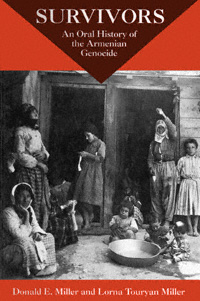 | Title: Survivors: an oral history of the Armenian genocide Author: Miller, Donald E. (Donald Earl) 1946- Published: University of California Press, 1993 Subjects: History | Middle Eastern History | Middle Eastern Studies | Religion Publisher's Description: Between 1915 and 1923, over one million Armenians died, victims of a genocidal campaign that is still denied by the Turkish government. Thousands of other Armenians suffered torture, brutality, deportation. Yet their story has received scant attention. Through interviews with a hundred elderly Armenians, Donald and Lorna Miller give the "forgotten genocide" the hearing it deserves. Survivors raise important issues about genocide and about how people cope with traumatic experience. Much here is wrenchingly painful, yet it also speaks to the strength of the human spirit. [brief] Similar Items |
| 28. | 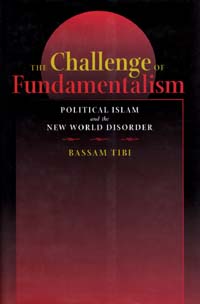 | Title: The challenge of fundamentalism: political Islam and the new world disorder Author: Tibi, Bassam Published: University of California Press, 1998 Subjects: Religion | Middle Eastern Studies | Middle Eastern History | Islam Publisher's Description: Long before the tragic events of September 11, 2001, Islamic fundamentalism was exerting a significant influence in nearly every corner of the world. Bassam Tibi, a widely recognized expert on Islam and Arab culture, offers an important and disquieting analysis of this particular synthesis of religion and politics. A Muslim and descendant of a famous Damascene Islamic scholar family, Tibi sees Islamic fundamentalism as the result of Islam's confrontation with modernity and not only--as it is widely believed--economic adversity. The movement is unprecedented in Islamic history and parallels the inability of Islamic nation-states to integrate into the new world secular order. For this updated edition, Tibi has written a new preface and lengthy introduction addressing Islamic fundamentalism in light of and since September 11. [brief] Similar Items |
| 29. | 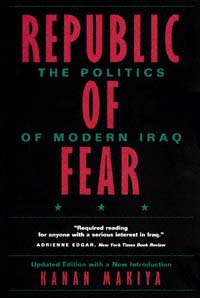 | Title: Republic of fear: the politics of modern Iraq Author: Makiya, Kanan Published: University of California Press, 1998 Subjects: Middle Eastern Studies | Politics | Middle Eastern History Publisher's Description: In 1968 a coup d'état brought into power an extraordinary regime in Iraq, one that stood apart from other regimes in the Middle East. Between 1968 and 1980, this new regime, headed by the Arab Ba'th Socialist party, used ruthless repression and relentless organization to transform the way Iraqis think and react to political questions. In just twelve years, a party of a few thousand people grew to include nearly ten percent of the Iraqi population.This book describes the experience of Ba'thism from 1968 to 1980 and analyzes the kind of political authority it engendered, culminating in the personality cult around Saddam Hussein. Fear, the author argues, is at the heart of Ba'thi politics and has become the cement for a genuine authority, however bizarre.Examining Iraqi history in a search for clues to understanding contemporary political affairs, the author illustrates how the quality of Ba'thi pan-Arabism as an ideology, the centrality of the first experience of pan-Arabism in Iraq, and the interaction between the Ba'th and communist parties in Iraq from 1958 to 1968 were crucial in shaping the current regime.Saddam Hussein's decision to launch all-out war against Iran in September 1980 marks the end of the first phase of this re-shaping of modern Iraqi politics. The Iraq-Iran war is a momentous event in its own right, but for Iraq, the author argues, the war diverts dissent against the Ba'thi regime by focusing attention on the specter of an enemy beyond Iraq's borders, thus masking a hidden potential for even greater violence inside Iraq. [brief] Similar Items |
| 30. | 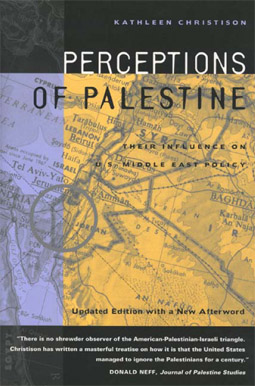 | Title: Perceptions of Palestine: their influence on U.S. Middle East policy Author: Christison, Kathleen 1941- Published: University of California Press, 1999 Subjects: Politics | Middle Eastern History | Middle Eastern Studies Publisher's Description: For most of the twentieth century, considered opinion in the United States regarding Palestine has favored the inherent right of Jews to exist in the Holy Land. That Palestinians, as a native population, could claim the same right has been largely ignored. Kathleen Christison's controversial new book shows how the endurance of such assumptions, along with America's singular focus on Israel and general ignorance of the Palestinian point of view, has impeded a resolution to the Arab-Israeli conflict. Christison begins with the derogatory images of Arabs purveyed by Western travelers to the Middle East in the nineteenth century, including Mark Twain, who wrote that Palestine's inhabitants were "abject beggars by nature, instinct, and education." She demonstrates other elements that have influenced U.S. policymakers: American religious attitudes toward the Holy Land that legitimize the Jewish presence; sympathy for Jews derived from the Holocaust; a sense of cultural identity wherein Israelis are "like us" and Arabs distant aliens. She makes a forceful case that decades of negative portrayals of Palestinians have distorted U.S. policy, making it virtually impossible to promote resolutions based on equality and reciprocity between Palestinians and Israelis. Christison also challenges prevalent media images and emphasizes the importance of terminology: Two examples are the designation of who is a "terrorist" and the imposition of place names (which can pass judgment on ownership). Christison's thoughtful book raises a final disturbing question: If a broader frame of reference on the Palestinian-Israeli conflict had been employed, allowing a less warped public discourse, might not years of warfare have been avoided and steps toward peace achieved much earlier? [brief] Similar Items |
| 31. | 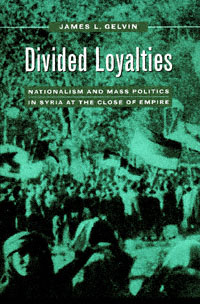 | Title: Divided loyalties: nationalism and mass politics in Syria at the close of Empire Author: Gelvin, James L 1951- Published: University of California Press, 1999 Subjects: History | Middle Eastern Studies | Middle Eastern History | Politics Publisher's Description: James L. Gelvin brings a new and distinctive perspective to the perennially fascinating topic of nationalism in the Arab Middle East. Unlike previous historians who have focused on the activities and ideas of a small group of elites, Gelvin details the role played by non-elites in nationalist politics during the early part of the twentieth century. Drawing from previously untapped sources, he documents the appearance of a new form of political organization - the popular committee - that sprang up in cities and villages throughout greater Syria in the immediate aftermath of the First World War. These committees empowered a new type of nationalist leadership, made nationalist politics a mass phenomenon for the first time, and articulated a view of nation and nationalism that continues to inform the politics of the region today.Gelvin does more than recount an episode in the history of nationalism in the Arab Middle East. His examination of leaflets, graffiti, speeches, rumors, and editorials offers fresh insights into the symbolic construction of national communities. His analysis of ceremonies - national celebrations, demonstrations, theater - contributes to our understanding of the emergence of mass politics. By situating his study within a broader historical context, Gelvin has written a book that will be of interest to all who wish to understand nationalism in the region and beyond. [brief] Similar Items |
| 32. | 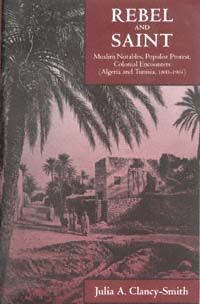 | Title: Rebel and saint: Muslim notables, populist protest, colonial encounters (Algeria and Tunisia, 1800-1904) Author: Clancy-Smith, Julia A Published: University of California Press, 1994 Subjects: History | Middle Eastern History | Postcolonial Studies | French Studies | African Studies Publisher's Description: Julia Clancy-Smith's unprecedented study brings us a remarkable view of North African history from the perspective of the North Africans themselves. Focusing on the religious beliefs and political actions of Muslim elites and their followers in Algeria and Tunisia, she provides a richly detailed analysis of resistance and accommodation to colonial rule.Clancy-Smith demonstrates the continuities between the eras of Turkish and French rule as well as the importance of regional ties among elite families in defining Saharan political cultures. She rejects the position that Algerians and Tunisians were invariably victims of western colonial aggression, arguing instead that Muslim notables understood the outside world and were quite capable of manipulating the massive changes occurring around them. [brief] Similar Items |
| 33. | 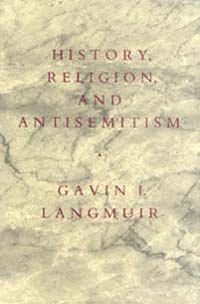 | Title: History, religion, and antisemitism Author: Langmuir, Gavin I Published: University of California Press, 1990 Subjects: History | Medieval History | Judaism | Sociology | Medieval Studies | Middle Eastern History Publisher's Description: Gavin I. Langmuir's work on the formation and nature of antisemitism has earned him an international reputation. In History, Religion, and Antisemitism he bravely confronts the problems that arise when historians have to describe and explain religious phenomena, as any historian of antisemitism must. How, and to what extent, can the historian be objective? Is it possible to discuss Christian attitudes toward Jews, for example, without adopting the historical explanations of those whose thoughts and actions one is discussing? What, exactly, does the historian mean by "religion" or "religious"? Langmuir's original and stimulating responses to these questions reflect his inquiry into the approaches of anthropology, sociology, and psychology and into recent empirical research on the functioning of the mind and the nature of thought. His distinction between religiosity, a property of individuals, and religion, a social phenomenon, allows him to place unusual emphasis on the role of religious doubts and tensions and the irrationality they can produce. Defining antisemitism as irrational beliefs about Jews, he distinguishes Christian anti-Judaism from Christian antisemitism, demonstrates that antisemitism emerged in the twelfth and thirteenth centuries because of rising Christian doubts, and sketches how the revolutionary changes in religion and mentality in the modern period brought new faiths, new kinds of religious doubt, and a deadlier expression of antisemitism. Although he developed it in dealing with the difficult question of antisemitism, Langmuir's approach to religious history is important for historians in all areas. [brief] Similar Items |
| 34. | 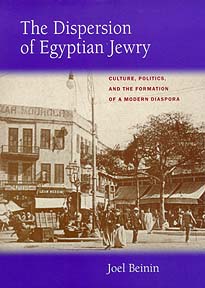 | Title: The dispersion of Egyptian Jewry: culture, politics, and the formation of a modern diaspora Author: Beinin, Joel 1948- Published: University of California Press, 1998 Subjects: History | Middle Eastern History | Religion | Judaism | Middle Eastern Studies | Jewish Studies Publisher's Description: In this provocative and wide-ranging history, Joel Beinin examines fundamental questions of ethnic identity by focusing on the Egyptian Jewish community since 1948. A complex and heterogeneous people, Egyptian Jews have become even more diverse as their diaspora continues to the present day. Central to Beinin's study is the question of how people handle multiple identities and loyalties that are dislocated and reformed by turbulent political and cultural processes. It is a question he grapples with himself, and his reflections on his experiences as an American Jew in Israel and Egypt offer a candid, personal perspective on the hazards of marginal identities. [brief] Similar Items |
| 35. | 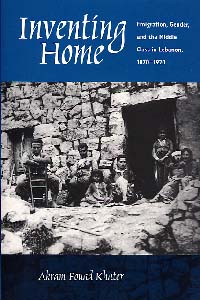 | Title: Inventing home: emigration, gender, and the middle class in Lebanon, 1870-1920 Author: Khater, Akram Fouad 1960- Published: University of California Press, 2001 Subjects: History | Middle Eastern History | Women's Studies | Sociology | Middle Eastern Studies Publisher's Description: Between 1890 and 1920 over one-third of the peasants of Mount Lebanon left their villages and traveled to the Americas. This book traces the journeys of these villagers from the ranks of the peasantry into a middle class of their own making. Inventing Home delves into the stories of these travels, shedding much needed light on the impact of emigration and immigration in the development of modernity. It focuses on a critical period in the social history of Lebanon--the "long peace" between the uprising of 1860 and the beginning of the French mandate in 1920. The book explores in depth the phenomena of return emigration, the questioning and changing of gender roles, and the rise of the middle class. Exploring new areas in the history of Lebanon, Inventing Home asks how new notions of gender, family, and class were articulated and how a local "modernity" was invented in the process.Akram Khater maps the jagged and uncertain paths that the fellahin from Mount Lebanon carved through time and space in their attempt to control their future and their destinies. His study offers a significant contribution to the literature on the Middle East, as well as a new perspective on women and on gender issues in the context of developing modernity in the region. [brief] Similar Items |
| 36. | 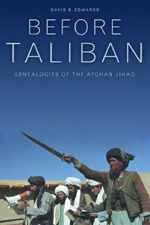 | Title: Before Taliban: genealogies of the Afghan jihad Author: Edwards, David B Published: University of California Press, 2002 Subjects: Anthropology | Cultural Anthropology | Middle Eastern Studies | Middle Eastern History | South Asia Publisher's Description: In this powerful book, David B. Edwards traces the lives of three recent Afghan leaders in Afghanistan's history--Nur Muhammad Taraki, Samiullah Safi, and Qazi Amin Waqad--to explain how the promise of progress and prosperity that animated Afghanistan in the 1960s crumbled and became the present tragedy of discord, destruction, and despair. Before Taliban builds on the foundation that Edwards laid in his previous book, Heroes of the Age, in which he examines the lives of three significant figures of the late nineteenth century--a tribal khan, a Muslim saint, and a prince who became king of the newly created state. In the mid twentieth century, Afghans believed their nation could be a model of economic and social development that would inspire the world. Instead, political conflict, foreign invasion, and civil war have left the country impoverished and politically dysfunctional. Each of the men Edwards profiles were engaged in the political struggles of the country's recent history. They hoped to see Afghanistan become a more just and democratic nation. But their visions for their country were radically different, and in the end, all three failed and were killed or exiled. Now, Afghanistan is associated with international terrorism, drug trafficking, and repression. Before Taliban tells these men's stories and provides a thorough analysis of why their dreams for a progressive nation lie in ruins while the Taliban has succeeded. In Edwards's able hands, this culturally informed biography provides a mesmerizing and revealing look into the social and cultural contexts of political change. [brief] Similar Items |
| 37. | 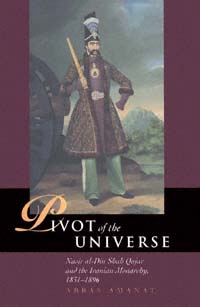 | Title: Pivot of the universe: Nasir al-Din Shah Qajar and the Iranian Monarchy, 1831-1896 Author: Amanat, Abbas Published: University of California Press, 1997 Subjects: History | Middle Eastern History | Middle Eastern Studies | Autobiographies and Biographies Publisher's Description: When he was assassinated in 1896, Nasir al-Din Shah had occupied the Peacock throne for nearly half a century. A colorful, complex figure, he is frequently portrayed as indolent and indulgent. Yet he was in many ways an effective ruler who displayed remarkable resilience in the face of dilemmas and vulnerabilities shared by most monarchs of the Islamic world in the nineteenth century. The Pivot of the Universe is the first biography of this fascinating monarch. In it Amanat traces Nasir al-Din Shah's transformation from an insecure crown prince, and later an erratic boy-king, to a ruler with substantial control over his government and foreign policy. He provides a vivid picture of the political culture that determined Nasir al-Din Shah's behavior and, ultimately, his conception of government: the mode of succession in an urbanizing nomadic dynasty, the complicated relationships of the harem and his family, and the fatherly role of his guardian-ministers.Based on extensive research into public and private papers, illustrated with drawings and photographs from the period, this book offers a fresh interpretation both of the significance of Nasir al-Din Shah and the way in which the Iranian monarchy, the centerpiece of an ancient political order, withstood and adjusted to the challenges of modern times. [brief] Similar Items |
| 38. |  | Title: Seven doors to Islam: spirituality and the religious life of Muslims Author: Renard, John 1944- Published: University of California Press, 1996 Subjects: Religion | Middle Eastern Studies | Middle Eastern History | Islam | Medieval Studies Publisher's Description: Seven Doors to Islam reveals the religious worldview and spiritual tradition of the world's one billion Muslims. Spanning the breadth of Islamic civilization from Morocco to Indonesia, this book demonstrates how Muslims have used the literary and visual arts in all their richness and diversity to communicate religious values. Each of the seven chapters opens a "door" that leads progressively closer to the very heart of Islam, from the foundational revelation in the Qur'an to the transcendent experience of the Sufi mystics. However, unlike most studies of Islam, which see spirituality as the concern of a minority of mystical seekers, Seven Doors demonstrates its central role in every aspect of the Islamic tradition. [brief] Similar Items |
| 39. | 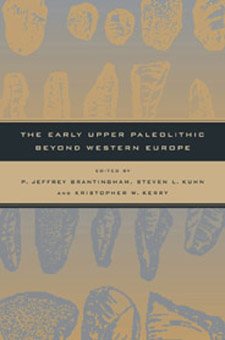 | Title: The early Upper Paleolithic beyond Western Europe Author: Brantingham, P. Jeffrey 1970- Published: University of California Press, 2004 Subjects: Anthropology | Archaeology | European History | European History | Middle Eastern History Publisher's Description: This volume brings together prominent archaeologists working in areas outside Western Europe to discuss the most recent evidence for the origins of the early Upper Paleolithic and its relationship to the origin of modern humans. With a wealth of primary data from archaeological sites and regions that have never before been published and discussions of materials from difficult-to-find sources, the collection urges readers to reconsider the process of modern human behavioral origins. Archaeological evidence continues to play a critical role in debates over the origins of anatomically modern humans. The appearance of novel Upper Paleolithic technologies, new patterns of land use, expanded social networks, and the emergence of complex forms of symbolic communication point to a behavioral revolution beginning sometime around 45,000 years ago. Until recently, most of the available evidence for this revolution derived from Western European archaeological contexts that suggested an abrupt replacement of Mousterian Middle Paleolithic with Aurignacian Upper Paleolithic adaptations. In the absence of fossil association, the behavioral transition was thought to reflect the biological replacement of archaic hominid populations by intrusive modern humans. The contributors present new archaeological evidence that tells a very different story: The Middle-Upper Paleolithic transitions in areas as diverse as the Levant, Eastern-Central Europe, and Central and Eastern Asia are characterized both by substantial behavioral continuity over the period 45,000-25,000 years ago and by a mosaic-like pattern of shifting adaptations. Together these essays will enliven and enrich the discussion of the shift from archaic to modern behavioral adaptations. [brief] Similar Items |
| 40. | 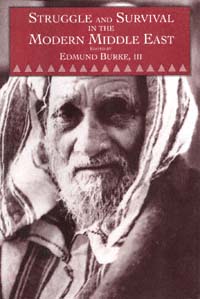 | Title: Struggle and survival in the modern Middle East Author: Burke, Edmund 1940- Published: University of California Press, 1993 Subjects: History | Middle Eastern History | Middle Eastern Studies | Autobiographies and Biographies Publisher's Description: Until now, we have known very little of the lives of ordinary Middle Eastern men and women, despite extensive research on the modern Middle East. With this collection of essays, the life stories of peasants, villagers, pastoralists, and urbanites can finally be heard - no more will our view of the Middle East be seen only over the shoulders of the elite.These twenty-four biographies are drawn from the entire Middle East - from Morocco to Afghanistan - and provide vantage points from which to understand modern Middle Eastern history "from the bottom up." Spanning the past 150 years and reflecting important transformations, the stories challenge elite-centered accounts of what has occurred in the Middle East and illuminate hidden corners of a largely unrecorded world.The essays, divided chronologically, provide a comprehensive framework for those unfamiliar with Middle Eastern social history. "Pre-Colonial Lives" covers the period from 1850 until World War I, "Colonial Lives" chronicles the beginning of European rule, and "Contemporary Lives" relates the massive changes of the postwar era. Through them, we see how specific ecologies, ways of life, ethnic, class and gender situations can shape individual human action. [brief] Similar Items |